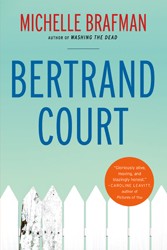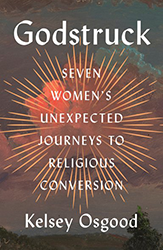Earlier this week, Michelle Brafman wrote about water and the mikvah in Judaism as well as the tahara, Jewish burial rituals. She is the author of the debut novel Washing the Dead and has been blogging here all week for Jewish Book Council’s Visiting Scribe series.
 My tormented relationship with the mechitzah sabotaged numerous drafts of my novel Washing the Dead. This came as a surprise to me because it had been years since I’d given thought to the wooden barrier that separated the men’s and women’s sections in the Orthodox synagogue of my youth.
My tormented relationship with the mechitzah sabotaged numerous drafts of my novel Washing the Dead. This came as a surprise to me because it had been years since I’d given thought to the wooden barrier that separated the men’s and women’s sections in the Orthodox synagogue of my youth.
As a child the mechitzah never bothered me, perhaps because I was an unusually tall girl, and from a young age I could see over it. I liked sitting with my mother and my friends and never pondered this gender segregation, not even when my family had to join a Conservative synagogue in order for me to become a bat mitzvah.
My first semester in college, however, a fiery philosophy professor introduced me to the likes of Sandra Bartky and Andrea Dworkin, and a feminist was born. I became attuned to the myriad ways women were marginalized. I scoffed at the Orthodox rationale that women did not need to perform rituals in the synagogue because we are more spiritually evolved or that our energies are best directed toward keeping the dietary laws, educating the children, and lighting the Sabbath candles. I steered clear of mechitzahs and held on tightly to my resentment until well into writing my novel.
Washing the Dead is set in a Orthodox Milwaukee synagogue and tells the story of the main character Barbara’s fierce yearning to return to this community from which she was exiled. My smart early readers all said that they didn’t understand Barbara’s desire to return to a world I’d been describing so critically. I couldn’t locate the criticism on the page until my daughter and I attended a bar mitzvah at a shul with a mechitzah. She went off to find her friends, and I stood alone staring out into this sea of women, pretty hats covering their hair, their heads leaning into each other during conversation. Memories flooded me. The women’s section was the beating heart of my childhood shul, where the regulars shared news of pregnancies, divorces, and illnesses and deaths in their families. And these women had kept track of me.
Lucette Lagnado described my sentiments beautifully in her memoir The Arrogant Years, “What I’d failed to realize was that for the women of my childhood, the world within our closed-off area was every bit as rich and vivid as the universe beyond it; and the barrier in fact fostered and intensified feelings of kinship and intimacy. Inside was a world that was remarkably collegial and embracing and kind.”
After the bar mitzvah, I went home and reread my pages, and I understood how my disdain for the traditions of my former shul was insidiously embedded in the simplest descriptions. I, and perhaps the spirit of Andrea Dworkin, were talking over Barbara, inserting political commentary about the mechitzah.
Unlike Barbara, I was never exiled from my community. But in the moment of returning to the mechitzah with my daughter, I felt a pull toward a spiritual home that I’d left, a home that I do not wish to return to, but that tugs at me enough to write, with truest feeling, the longing my character felt for the mechitzah of her youth.
Michelle Brafman’s essays and short stories have appeared in the Washington Post, Slate, Tablet, Lilith Magazine,the minnesota review, and elsewhere. She teaches fiction writing at the Johns Hopkins MA in Writing Program. Visit her website at www.michellebrafman.com.
Related Content:
- Reading List: Feminist Jewish Perspectives
- 10 Inspiring Ways That Women Are Fighting for Justice in Israel by Elana Maryles Sztokman
- New Jewish Feminism: Probing the Past, Forging the Future edited by Elyse Goldstein
Michelle Brafman’s fiction and essays have appeared in The Washington Post, Slate, Tablet, and others. A regular contributor to the Lilith Magazine blog, she has led its salon discussions at theaters and arts centers throughout the Washington, DC area. She teaches fiction writing at Johns Hopkins University and lives in Glen Echo, Maryland with her husband and two children.



